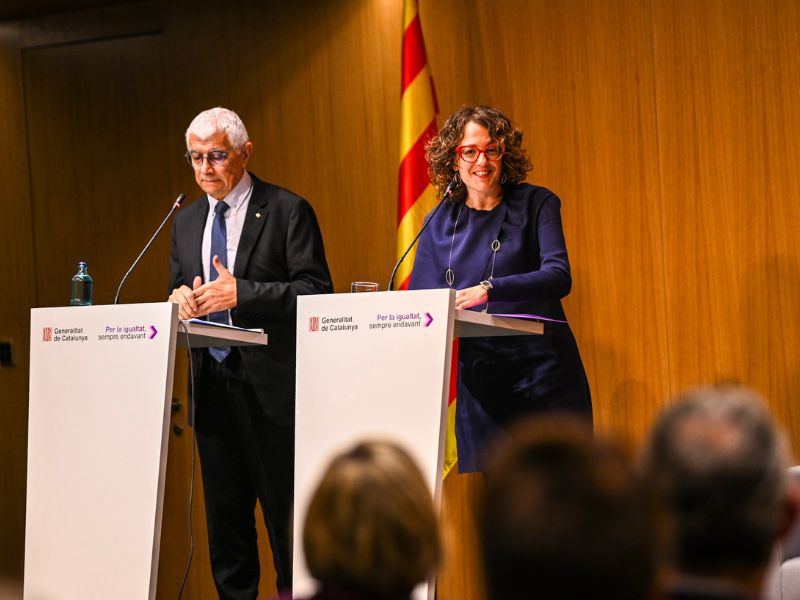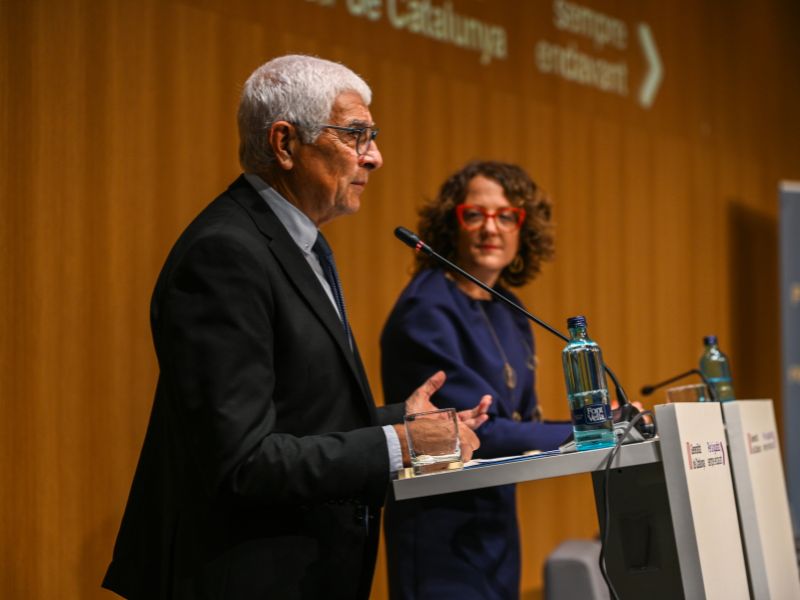- The Plan, which has a budget of 7 million euros, will run for 6 years and includes over 50 initiatives, including an extensive training plan for professionals, the creation of committees to address obstetric violence, and reducing the number of unnecessary caesarean sections and operations, among other issues
- Produced in collaboration with industry professionals and experts, the Plan focuses on providing an effective guarantee of sexual and reproductive rights and improving the quality of the Catalan healthcare system

The Catalan Government, through its Ministries of Health and Equality and Feminisms, has launched the Plan to address obstetric violence and the violation of sexual and reproductive rights, which has a budget of seven million euros. The Plan will run for six years (2023-2028) and includes over fifty initiatives aimed at increasing awareness and providing information on sexual and reproductive rights; enhancing professional training and skills, and improving care and support services. The Plan, whose creation involved the collaboration of experts, will ensure that these rights are fully guaranteed and will improve the quality of Catalonia’s healthcare system, thereby putting an end to procedures that are incorrect, applied merely as routine, or not subject to the patient’s consent.
Accordingly, the measures in the Plan, which is an internationally pioneering measure in its field, include the creation of obstetric violence committees in all health authority regions, reducing caesarean sections and other procedures carried out without due cause, increasing women’s participation in decision-making, and improving access to reproductive medicine. Spaces will be allocated to ensure care is provided during deliveries in non-medical environments, and the number of birthing centres will be increased. The Plan also includes actions for specific groups, including the gradual adaptation of spaces and providing resources needed to care for people with disabilities or neurodivergence issues, based on the results of mapping.
This Plan aims to be a transformative instrument for both citizens and healthcare professionals, and it places particular emphasis on identifying and raising awareness of good practices for care that is based on respect and rights. One of the main themes of the Plan is the provision of training for professional teams, and it contains an ambitious training plan for the next six years. This includes a specific module for training resident health staff and other professionals in the Catalan healthcare system in sexual and reproductive rights. Specific training will also be provided in various areas including endometriosis and improving early diagnosis, improving contraceptive care, voluntary terminations of pregnancy, the health of transgender* people and perinatal mental health, and support after perinatal loss, among other issues.
The Minister for Equality and Feminisms, Tània Verge Mestre, said at the launch: “This is a legislature that promotes and defends sexual and reproductive rights. This is a legislature in which the Catalan Government at last confers the importance it deserves on everything that happens to our bodies and our sexuality. Because it is central to health, well-being and personal self-determination – because the right to decide about our bodies is the basis for exercising many other rights. It is part of the feminist transformation, and it is also a responsibility we accept as a progressive, anti-fascist government in the face of threats from anti-rights and anti-gender groups, and the rollbacks imposed by the far right wherever it governs. Catalonia is and will remain a bastion and spearhead for sexual and reproductive rights, which are human rights.”
“We are the first government in the world to adopt a plan to address obstetric violence and the violation of sexual and reproductive rights. Our Plan leads the way in implementing the standards established by the World Health Organization (WHO),” she added. The Minister also said: “It is a source of pride that a public healthcare system that is already a pioneer and an international benchmark of quality in many areas is making a courageous commitment like this one, especially because it is doing so in the awareness that healthcare practice improves and guarantees more rights if it incorporates the intersectional gender perspective. It is no coincidence that this firm commitment is being made when the feminist transformation involves all the government’s actions, which has not been the case until now.”
Catalan Minister for Health, Manel Balcells, described the Plan as “positive”, and said that it entails “training, changes in habits and protocols that we must follow strictly, and that applies to the entire healthcare system – both public and private.” “The Plan aims to improve the situation, appreciating people’s rights, reaching consensus and making decisions based on consensus,” he said.
Balcells recalled that the Plan is the result of more than a year’s work by the two Ministries, and is “a very carefully considered plan, with a timetable and a budget, and fifty specific actions to be implemented.” He added that the term “obstetric violence” may “create misgivings among professionals because they do not want to hurt anyone. However, it is a term that encompasses things that have always happened, because our traditional perspective has been sexist – we have been taught medicine from a sexist perspective, and that is something we must change. That is not an accusation. It is an area on which we can improve, where we can do things differently, and when you look at it you realise that everything that was done without informing people and based on their agreement was not right and was not fair.”

The Plan to address obstetric violence and the violation of sexual and reproductive rights is the result of work which began a year ago, involved a working group made up of representatives of the Catalan Association of Midwives, the Catalan Society of Gynaecology and Obstetrics, and the two hospital committees on obstetric violence in Catalonia at Germans Trias i Pujol Hospital and Vall d’Hebron University Hospital, as well as experts and professionals from the healthcare system. The participants in the Plan are: Maria Victòria Cambredó, President of the Catalan Association of Midwives; Oriol Porta, President of the Catalan Society of Gynaecology and Obstetrics; Elena Carreras, Chair of the Gender Policy Advisory Board of the Ministry of Health; Jesús Cobo, clinical coordinator of the Perinatal Mental Health Plan; Cristina Martínez, coordinator of sexual and reproductive healthcare services at the Catalan Health Institute; Gemma Falguera, from the Catalan Association of Midwives; Marta Busquets, lawyer and expert in the defence of respected delivery; Maria Carmen Comas, head of the Obstetrics and Gynaecology Department at Germans Trias i Pujol Hospital; Lucía Alcaraz, member of the Obstetric Violence Committee at Germans Trias i Pujol Hospital; Vanessa Bueno, chair of the Obstetric Violence Subcommittee at Vall d’Hebron University Hospital; Blanca Prats, head of the Maternal and Infant Health Service of the Catalan Public Health Agency, and Serena Brigidi, anthropologist and expert on obstetric violence at Rovira i Virgili University.
Normalised and largely concealed violence
Catalonia is among the few countries in the world that has incorporated the fight against obstetric violence and the violation of sexual and reproductive rights into its legal framework. The Law on the right of women to eradicate gender-based violence (Law 17/2020, of 22 December, which amends Law 5/2008) is a pioneering recognition of this issue at a European level. Obstetric and gynaecological violence and how to address them is now on the agendas of multilateral organisations including United Nations agencies, such as the World Health Organization and the Committee on the Elimination of Discrimination against Women (CEDAW), the European Union and the Council of Europe. Based on a feminist and human rights-based approach, this issue has been conceived in terms of a violation of sexual and reproductive rights and as a form of violence against women.
It is a type of violence that has tended to be normalised and largely concealed, and takes the form of procedures that are incorrect, applied merely as routine, or not subject to the patient’s consent. These include episiotomies, induced labour without due cause, caesarean sections without any clear indications to perform them, painful operations without anaesthesia, the imposition of a specific position for labour, not allowing the woman to move during labour, and excessive and unnecessary administrations of drugs that could cause serious complications. This violence can also be psychological, in the form of infantilisation, and paternalistic, authoritarian, derogatory, humiliating, depersonalised or humiliating treatment of the patient.
Apart from in pregnancy, childbirth and the postpartum period, these practices also arise in sexual and reproductive healthcare throughout women’s lives. For example, they are reflected in issues such as the lack of training about the sexual and reproductive health of transgender* people, inadequate care for lesbian women (e.g. the assumption that they do not need Pap smear tests because they do not engage in penetrative sex) and women with disabilities (the common assumption is that they do not have sex, or there is no equipment available to perform gynaecological tests because of their reduced mobility) or a failure to take into account the impact of surgery on cancer patients in terms of their sexuality.








